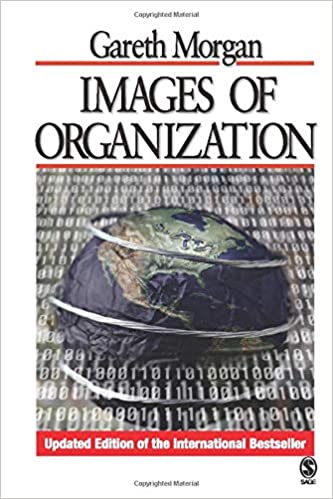Images of Organization |

|
 Diese Seite wurde seit 2 Jahren inhaltlich nicht mehr aktualisiert.
Unter Umständen ist sie nicht mehr aktuell.
Diese Seite wurde seit 2 Jahren inhaltlich nicht mehr aktualisiert.
Unter Umständen ist sie nicht mehr aktuell.
 Zusammenfassungen
Zusammenfassungen
 Der Autor zeigt, wie Metaphern unser Denken über Organisationen bestimmen und unser Handeln in Unternehmen beeinflussen. Er gibt einen Überblick über die Theorien, auf deren Oberfläche sich die entscheidenden Metaphern von Organisationen gebildet haben.
Der Autor zeigt, wie Metaphern unser Denken über Organisationen bestimmen und unser Handeln in Unternehmen beeinflussen. Er gibt einen Überblick über die Theorien, auf deren Oberfläche sich die entscheidenden Metaphern von Organisationen gebildet haben.
In einem Fallbeispiel erläutert Gareth Morgan schliesslich, wie und mit welchen Folgen sich diese Theorien und ihre Metaphern anwenden lassen und wie es gelingt, eine wirkliche Diagnostik von Organisationen zu entwickeln und anzuwenden.
 Since its first publication over twenty years ago, Images of Organization has become a classic in the canon of management literature. The book is based on a very simple premise—that all theories of organization and management are based on implicit images or metaphors that stretch our imagination in a way that can create powerful insights, but at the risk of distortion. Gareth Morgan provides a rich and comprehensive resource for exploring the complexity of modern organizations internationally, translating leading-edge theory into leading-edge practice.
Since its first publication over twenty years ago, Images of Organization has become a classic in the canon of management literature. The book is based on a very simple premise—that all theories of organization and management are based on implicit images or metaphors that stretch our imagination in a way that can create powerful insights, but at the risk of distortion. Gareth Morgan provides a rich and comprehensive resource for exploring the complexity of modern organizations internationally, translating leading-edge theory into leading-edge practice. Dieses Buch erwähnt ...
Dieses Buch erwähnt ...
 Personen KB IB clear | Christopher Alexander , Ross Ashby , Gregory Bateson , Stafford Beer , David Bohm , Edward de Bono , John Seely Brown , Peter Drucker , Ulla G. Foehr , Thomas Friedman , Felix Geyer , Malcolm Gladwell , Douglas Hofstadter , Mark Johnson , Kevin Kelly , G. Lakoff , Steven Levy , Frank Levy , Karl Marx , Humberto R. Maturana , Douglas McGregor , Richard Murnane , Gordon Pask , F. David Peat , Martin Post , Gilbert Probst , Howard Rheingold , Victoria J. Rideout , Jeremy Rifkin , Donald F. Roberts , Bertrand Russell , Edgar Schein , Peter M. Senge , Burrhus F. Skinner , George Spencer-Brown , Don Tapscott , Alvin Toffler , Hans Ulrich , Francisco J. Varela , Duncan J. Watts , Alfred North Whitehead , Norbert Wiener , Ludwig Wittgenstein , J. van der Zouwen , Shoshana Zuboff | |||||||||||||||||||||||||||||||||||||||||||||||||||||||||||||||||||||||||||||||||||||||||||||||||||||||||||||||||||||||||||||||||||||||||||||||||||||||||||||||||||||||||||||||||||||||||||||||||||||||||||||||||||||||||||||||||||||||||||||||||||||||||||||||||||||||||||||||||||||||||||||||||||||||||||||||||||||||||||||||||||||||||||||||||||||||||||||||||||||||||||||||||||||||||||||||||||||||||||||||||||||||||||||||||||||||||||||||||||||||||||||||||||||||||||
 Aussagen KB IB clear | Organisation = Flux und Transformationorganizations as £ux and transformation
Organisation = Gehirnorganizations as brains Organisation = Instrument der Dominationorganizations as instruments of domination Organisation = Kulturorganizations as cultures Organisation = Maschineorganizations as machines Organisation = Organismusorganizations as organisms Organisation = Politisches Systemorganizations as political systems Organisation = Psychisches Gefängnisorganizations as psychic prisons | |||||||||||||||||||||||||||||||||||||||||||||||||||||||||||||||||||||||||||||||||||||||||||||||||||||||||||||||||||||||||||||||||||||||||||||||||||||||||||||||||||||||||||||||||||||||||||||||||||||||||||||||||||||||||||||||||||||||||||||||||||||||||||||||||||||||||||||||||||||||||||||||||||||||||||||||||||||||||||||||||||||||||||||||||||||||||||||||||||||||||||||||||||||||||||||||||||||||||||||||||||||||||||||||||||||||||||||||||||||||||||||||||||||||||||
 Begriffe KB IB clear | Komplexitätcomplexity
,  Management Management management
, Metaphermetaphor
, Taylorismustaylorism
, Theorietheory
, Total Quality Management (TQM)Total Quality Management
, management
, Metaphermetaphor
, Taylorismustaylorism
, Theorietheory
, Total Quality Management (TQM)Total Quality Management
,  Unternehmen Unternehmen company company
| |||||||||||||||||||||||||||||||||||||||||||||||||||||||||||||||||||||||||||||||||||||||||||||||||||||||||||||||||||||||||||||||||||||||||||||||||||||||||||||||||||||||||||||||||||||||||||||||||||||||||||||||||||||||||||||||||||||||||||||||||||||||||||||||||||||||||||||||||||||||||||||||||||||||||||||||||||||||||||||||||||||||||||||||||||||||||||||||||||||||||||||||||||||||||||||||||||||||||||||||||||||||||||||||||||||||||||||||||||||||||||||||||||||||||||
 Bücher |
| |||||||||||||||||||||||||||||||||||||||||||||||||||||||||||||||||||||||||||||||||||||||||||||||||||||||||||||||||||||||||||||||||||||||||||||||||||||||||||||||||||||||||||||||||||||||||||||||||||||||||||||||||||||||||||||||||||||||||||||||||||||||||||||||||||||||||||||||||||||||||||||||||||||||||||||||||||||||||||||||||||||||||||||||||||||||||||||||||||||||||||||||||||||||||||||||||||||||||||||||||||||||||||||||||||||||||||||||||||||||||||||||||||||||||||
 Texte |
|
 Zitationsgraph
Zitationsgraph
 Zitationsgraph (Beta-Test mit vis.js)
Zitationsgraph (Beta-Test mit vis.js)
 Zeitleiste
Zeitleiste
 19 Erwähnungen
19 Erwähnungen 
- Management of Uncertainty - Theory and Application in the Design of Systems and Organizations (Gundela Grote)

- Die Organisation aus der Wissensperspektive - Möglichkeiten und Grenzen der Intervention (Kai Romhardt) (1998)

- Wissen managen - Wie Unternehmen ihre wertvollste Ressource optimal nutzen (Gilbert Probst, S. P. Raub, Kai Romhardt) (1999)

- Entwicklung internetgestützter Lernprogramme - Dissertation (Urs Gröhbiel) (2001)


- Social Construction in Context (Kenneth Gergen) (2001)

- Emergence - The Connected Lives of Ants, Brains, Cities, and Software (Steven Johnson) (2001)

- Systems Thinking - Creative Holism for Managers (Michael C. Jackson) (2003)


- The SAGE Handbook of Organization Studies (Stewart R Clegg, Cynthia Hardy, Tom Lawrence, Walter R Nord) (2006)

- 7. Critical Theory and Postmodernism Approaches to Organizational Studies (Mats Alvesson, Stanley A. Deetz)

- 7. Critical Theory and Postmodernism Approaches to Organizational Studies (Mats Alvesson, Stanley A. Deetz)
- Co-citation analysis and the search for invisible colleges - A methodological evaluation (Markus Gmür) (2006)


- Zum Beitrag von Weblogs zur Konstitution einer Organisationsidentität (Thomas Praus) (2007)


- Persönliche Weblogs in Organisationen - Spielzeug oder Werkzeug für ein zeitgemäßes Wissensmanagement? (Karsten Ehms) (2007)


- Systems Thinkers (Magnus Ramage, Karen Shipp) (2009)

- Theory U - Leading From the Future as it Emerges (2009)

- Web 2.0-Based E-Learning - Applying Social Informatics for Tertiary Teaching (Mark J.W. Lee, Catherine McLoughlin) (2010)

- Entscheidungsprozesse in Organisationen - Eine Einführung (2010)

- Bringing Schools into the 21st Century (Guofang Wan, Dianne M. Gut) (2011)

- 11. Redesigning Teacher Education from the Ground Up - A Collaborative Model (Renée A. Middleton, Bonnie L. Prince)


- 11. Redesigning Teacher Education from the Ground Up - A Collaborative Model (Renée A. Middleton, Bonnie L. Prince)
- Reinventing Organizations (Frederic Laloux) (2014)

- Art education in the post-digital era - Experiential construction of knowledge through creative coding (Tomi Slotte Dufva) (2018)


- Metaphors of code - Structuring and broadening the discussion on teaching children to code (Tomi Slotte Dufva, Mikko Dufva) (2016)


- Metaphors of code - Structuring and broadening the discussion on teaching children to code (Tomi Slotte Dufva, Mikko Dufva) (2016)
- Angewandte Psychologie - Beiträge zu einer menschenwürdigen Gesellschaft (Daniel Süss, Christoph Negri) (2019)


- 5. Entwurf einer lebensdienlichen Organisation (Michael Zirkler)


- 5. Entwurf einer lebensdienlichen Organisation (Michael Zirkler)
 Co-zitierte Bücher
Co-zitierte Bücher

Zur Theorie und Praxis menschlichen Wandels
Change
Principles of Problem Formation and Problem Resolution
(Paul Watzlawick, John H. Weakland, Richard Fisch) (1974)


Die Wirtschaft der Gesellschaft
(Niklas Luhmann) (1999) Bei amazon.de als Paperback-Ausgabe anschauen
Bei amazon.de als Paperback-Ausgabe anschauen
The Art & Practice of the Learning Organization
The Fifth Discipline
The Art & Practice of the Learning Organization
(Peter M. Senge) (1990)


Organizational culture and leadership
(Edgar Schein) (1985) Volltext dieses Dokuments
Volltext dieses Dokuments
 Bibliographisches
Bibliographisches 
 Beat und dieses Buch
Beat und dieses Buch
 Beat hat dieses Buch während seiner Zeit am Institut für Medien und Schule (IMS) ins Biblionetz aufgenommen. Beat besitzt kein physisches, aber ein digitales Exemplar. (das er aber aus Urheberrechtsgründen nicht einfach weitergeben darf). Beat selbst sagt, er habe dieses Dokument nicht gelesen.
Beat hat dieses Buch während seiner Zeit am Institut für Medien und Schule (IMS) ins Biblionetz aufgenommen. Beat besitzt kein physisches, aber ein digitales Exemplar. (das er aber aus Urheberrechtsgründen nicht einfach weitergeben darf). Beat selbst sagt, er habe dieses Dokument nicht gelesen.






 (
(






 , 24199 kByte)
, 24199 kByte) 



 Biblionetz-History
Biblionetz-History